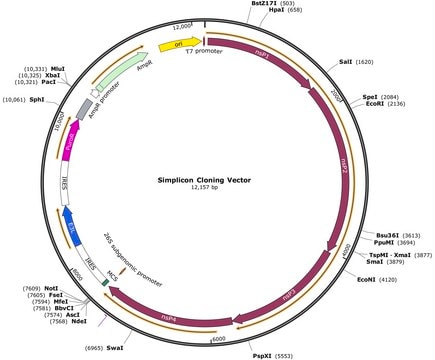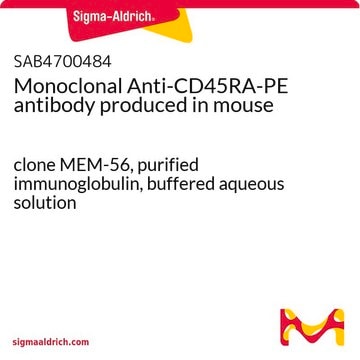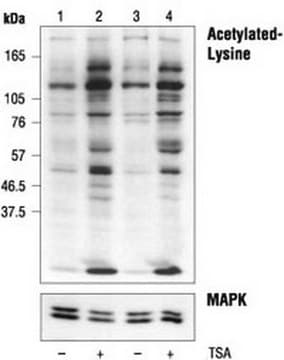05-1413
Anti-CD45RA Antibody, Clone MEM 56
clone MEM 56, from mouse
Synonym(s):
CD45 antigen, Leukocyte common antigen precursor, SCID due to PTPRC deficiency, T200 glycoprotein, T200 leukocyte common antigen, Human homolog of severe combined immunodeficiency due to PTPRC deficiency, Leukocyte-common antigen, Protein tyrosine phosph
About This Item
IF
IHC
IP
WB
immunofluorescence: suitable
immunohistochemistry: suitable (paraffin)
immunoprecipitation (IP): suitable
western blot: suitable
Recommended Products
biological source
mouse
Quality Level
antibody form
purified immunoglobulin
antibody product type
primary antibodies
clone
MEM 56, monoclonal
species reactivity
mouse
species reactivity (predicted by homology)
human, rat
technique(s)
flow cytometry: suitable
immunofluorescence: suitable
immunohistochemistry: suitable (paraffin)
immunoprecipitation (IP): suitable
western blot: suitable
isotype
IgG2b
NCBI accession no.
UniProt accession no.
shipped in
wet ice
target post-translational modification
unmodified
Gene Information
human ... PTPRC(5788)
Related Categories
General description
Specificity
Antigen distribution:
B-cells (lg+) >95%
T-cells (E+) 70 + 10%
Peripheral blood lymphocytes 68 + 8%
T-cells (CD4+) 50 + 10%
Monocytes 50 + 20%
Thymocytes <5%
Granulocytes <1%
Application
Immunoprecipitation: A previous lot of this antibody detected 220 kDa molecular weight component of the leucocyte common antigen complex in immunoprecipitation.
Flow Cytometry: Purification or depletion of CD4+ suppressor/inducer cells by cell sorting or the panning techniques was performed on a previous lot.
Immunohistochemistry(paraffin): Representative testing from a previous lot.
Identification of CD45R+ lymphocytes in cryostat sections of frozen tissue and in formalin fixed wax embedded tissue.
Optimal Staining of CD45RA Monoclonal Antibody: Tonsil
Signaling
Immunological Signaling
Quality
Western Blot Analysis: 1:500 dilution of this lot detected CD45RA on 10 μg of RAW 264
Target description
Linkage
Physical form
We recommend that each laboratory determine an optimum working titre for use in its particular application.
Storage and Stability
Handling Recommendations: Upon first thaw, and prior to removing the cap, centrifuge the vial and gently mix the solution. Aliquot into microcentrifuge tubes and store at -20°C. Avoid repeated freeze/thaw cycles, which may damage IgG and affect product performance.
Analysis Note
RAW264 Cell Lysate
Other Notes
Disclaimer
Not finding the right product?
Try our Product Selector Tool.
recommended
Storage Class Code
12 - Non Combustible Liquids
WGK
WGK 2
Flash Point(F)
Not applicable
Flash Point(C)
Not applicable
Certificates of Analysis (COA)
Search for Certificates of Analysis (COA) by entering the products Lot/Batch Number. Lot and Batch Numbers can be found on a product’s label following the words ‘Lot’ or ‘Batch’.
Already Own This Product?
Find documentation for the products that you have recently purchased in the Document Library.
Our team of scientists has experience in all areas of research including Life Science, Material Science, Chemical Synthesis, Chromatography, Analytical and many others.
Contact Technical Service








